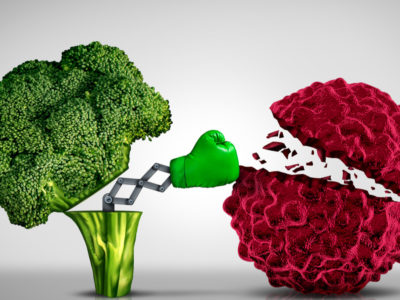Table of Contents[Hide][Show]
The signs are unavoidable.
Bloating… anemia… fatigue…
Clearly, something is going on with your body, and a doctor’s visit confirms it: celiac disease.
You may have already heard of this surprisingly common medical condition. You may even know that, like many digestive disorders, it’s related to gluten consumption.
But how will this diagnosis change your life?
Let’s take a closer look at celiac disease, how it affects your health, and how you can effectively treat it and prevent recurring symptoms.
What Is Celiac Disease?
Celiac disease is an incredibly common autoimmune disease triggered by the consumption of gluten. It can cause long-lasting digestive issues and keep you from getting the nutrients you need to be healthy.
To better understand celiac disease, let’s take a closer look at a couple of those terms.
First, let’s define an autoimmune disease. This is a group of about 100 diseases in which your immune system, the body’s defense system, mistakenly perceives your body’s own healthy cells as foreign, harmful cells. As a result, your immune system attacks your body, causing damage to cells, tissues, and organs.
In the case of celiac disease, your immune response is activated when you eat gluten. This is a type of protein that occurs naturally in grains such as barley, rye, and wheat. It can also be extracted, concentrated, and added to other foods for extra protein, flavor, and texture.
Roughly 1 in 100 adults suffers from celiac disease, although only roughly 30% receive the proper diagnosis.
If you have celiac disease, your immune system responds to gluten consumption by attacking your small intestine. This damages the villi, which are responsible for nutrient absorption.
As a result, your body can’t absorb nutrients, including proteins, vitamins, minerals, and other necessary compounds.
Related
Is Gluten Bad For You? Let’s Find Out!
Is gluten bad for you? We will get the answer straight from digestion expert, Dr. Tom O’Bryan, as well as other things you need to know about gluten!
Types of Celiac Disease
There are two types of celiac disease, classical and non-classical.
Classical celiac disease shows symptoms due to the malabsorption of nutrients. This can include diarrhea, weight loss, and anemia.
In non-classical celiac disease, the digestive symptoms are mild (or non-existent) and other symptoms may be seemingly unrelated, such as skin rashes, headaches, infertility, and more.
Who Is at Risk for Celiac Disease?
Celiac disease is hereditary. If you have a parent, child, or sibling, who suffers from celiac disease, your chances of also having it skyrocket to 1 in 10.
For that reason, if you have a first-degree relative with celiac disease you should talk to a doctor about getting tested.
Diagnosing Celiac Disease
Early diagnosis is crucial with celiac disease.
You should see your doctor if you have digestive issues that last for more than two weeksor consult with your child’s doctor if they are pale, irritable, not growing, or having foul-smelling, bulky stools.
If you suspect that you may have celiac disease, it’s important that you go see a doctor as soon as possible.
For one thing, your quality of life will improve once you begin avoiding gluten and its symptoms.
But more importantly, the earlier in life celiac disease is diagnosed and treated, the less likely you are to develop other autoimmune disorders, such as type 1 diabetes or multiple sclerosis (MS).
Your doctor (or your child’s doctor) will consider several factors before diagnosing celiac disease. This includes looking over your medical and family history and conducting a complete physical exam, along with blood tests, small intestine biopsies, skin biopsies, and genetic testing.
Make sure you see your doctor before reducing or eliminating gluten, which could affect your test results.
Symptoms of Celiac Disease
With more than 200 known symptoms, celiac disease can affect people differently.
Since celiac disease leads to an attack on the small intestine, many symptoms will occur in your digestive system. However, some are as seemingly unrelated to digestion as ADHD or missed periods.
Celiac Disease Symptoms in Children
Celiac disease can strike at any age, including children as young as infants. The lack of nutrient absorption can impede growth and development.
Wondering if your child might have celiac disease?
Here are some of the most common symptoms you might see in children.
- Abdominal pain
- Anxiety
- Attention-deficit/ hyperactivity disorder (ADHD)
- Bloating
- Chronic diarrhea
- Constipation
- Damage to tooth enamel
- Delayed puberty
- Depression
- Failure to thrive
- Fatigue
- Gas
- Headaches
- Iron-deficiency anemia
- Irritability
- Lack of muscle coordination
- Learning disabilities
- Nausea
- Pale, foul-smelling stool
- Seizures
- Short stature
- Weight Loss
Celiac Disease in Adults
In some cases, celiac disease won’t show up until adulthood. Although adults might have some digestive issues, over 50% of adults with celiac disease exhibit non-digestive symptoms.
If you think you might have celiac disease, here are some symptoms to look out for.
- Abdominal pain
- Anxiety
- Bloating
- Canker sores
- Cognitive impairment (trouble concentrating, forgetfulness, indecisiveness)
- Constipation
- Diarrhea
- Depression
- Fatigue
- Gas
- Headaches (or migraines)
- Hyposplenism (reduced spleen function)
- Iron-deficiency anemia
- Joint pain
- Migraines
- Missed periods
- Mouth ulcers and canker sores
- Nausea
- Osteoporosis (brittle bones) and osteomalacia (soft bones)
- Peripheral neuropathy, including muscle weakness, muscular atrophy, numbness, and tingling
- Vomiting
- Weight loss
However, you may have celiac disease and be completely asymptomatic, a condition known as silent celiac disease. But even if you don’t have symptoms, your immune system is attacking and damaging your small intestine when you eat gluten.
In this case, following a gluten-free diet can have positive health benefits, such as reduced acid reflux or bloating—symptoms you may have not even noticed, but will notice when they are improved.
Related
5 Easy and Healthy Fall Recipes That Won’t Cause Bloat
Rejoice, gassy people, because here are the best healthy and delicious fall recipes that won’t cause constipation or bloating!
Skin Conditions and Celiac Disease
One symptom in particular merits extra consideration: dermatitis herpetiformis. This itchy, blistering skin rash is often seen by celiac sufferers and occurs mainly in the buttocks, elbows, knees, scalp, and torso.
The rash will slowly disappear if you eliminate gluten from your diet. Even a small amount of gluten, though, could quickly bring it back.
If this is one of your celiac disease symptoms, your doctor may choose to treat it with a gluten-free diet, medication, or both.
Long-Term Effects of Celiac Disease
Left untreated, celiac disease can lead to a number of long-term health issues.
These include:
- Early onset osteoporosis (brittle, fragile bones) or osteopenia (low bone density)
- Gallbladder issues
- Heart disease
- Infertility
- Intestinal cancer
- Iron deficiency
- Lactose intolerance
- Liver failure
- Malnutrition (due to lack of nutrient absorption)
- Miscarriage
- Neurological issues such as attention deficit hyperactivity disorder (ADHD), headaches, seizures, and dementia
- Non-Hodgkin lymphoma
- Pancreatic issues
- Skin rashes
- Vitamin and mineral deficiencies
In addition, if you have celiac disease, you are at a 2x greater risk of coronary artery disease and a 4x greater risk of small intestine cancer.
Related
The Undeniable Link Between Diet and Cancer
This article explores how diet and cancer are connected, which foods you should eat to fight or even prevent cancer, and which foods you should avoid.
Causes of Celiac Disease
Celiac disease is hereditary; you’ll have to have one or both of the celiac genes to develop the disease.
However, although an estimated 30% of the population has the gene, only about 1% develop celiac disease.
Although researchers have not yet discovered exactly what activates the celiac genes, suspected triggers include environmental factors and stressors such as illness and infections, trauma, puberty, and childbirth.
And, research shows that children who have the celiac gene and eat a high amount of gluten in early childhood are more likely to develop the disease.
Treating Celiac Disease
Currently, science has yet to find a “cure” for celiac disease.
The most effective treatment is to stick to a gluten-free diet, as even small amounts of gluten can cause severe intestinal damage.
If you’ve been diagnosed with celiac disease, you may want to consult a licensed dietitian specializing in the disease. They can help you create a balanced, healthy diet that you’ll enjoy, even without gluten.
Celiac Disease and Gut Bacteria
A gluten-free diet is a great place to start and will treat and prevent symptoms of celiac disease for most people.
Unfortunately, going gluten-free doesn’t work for every patient and every symptom. You might still experience symptoms even after you’ve cut gluten from your diet.
And, even if you think you’re adhering strictly to a gluten-free lifestyle, gluten may still make its way into your digestive system.
Dining out is the main culprit, since up to 50% of the “gluten-free” foods in restaurants still contain this potentially harmful protein. Gluten is also found in a number of unexpected places, such as chewing gum, toothpaste, and some medications.
And with just a minuscule amount of gluten—as small as a few breadcrumbs—triggering symptoms, prevention needs to go a bit further than avoiding gluten.
That’s why we recommend Gluten Away, a digestive aid that breaks down gluten molecules before they reach your intestines and protects you from accidental gluten consumption.
This incredibly effective gluten digestive aid functions in your stomach, large intestine, and small intestine, leaving behind 0% residual gluten for total digestive support.
As a bonus, Gluten Away also contains powerful strains of spore probiotics, which boost the overall health of your gut microbiome and alleviate common digestive issues.
Final Thoughts
Celiac disease is incredibly common. If you’ve been noticing any of the symptoms above, especially after consuming gluten, it’s time to consult with a doctor. Because ignoring these symptoms will only make them worse and possibly bring other, more serious, health effects.
But there’s good news…
A gluten-free diet can reduce or even eliminate celiac symptoms, so you can live a healthy, happy life despite a celiac diagnosis!
You May Also Like…






